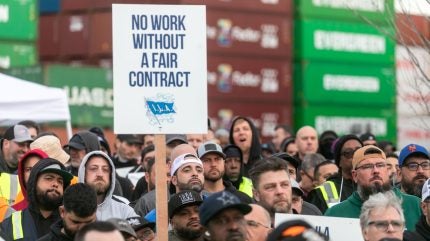
Some of the largest US ports are set to face widespread disruption as around 45,000 port workers begin strike action amid contract disputes between the International Longshoremen’s Association (ILA) and the US Maritime Alliance (USMX).
The strikes began at 12:01am on Tuesday 1 October and will affect 36 ports on the US East and Gulf coasts, representing around half of the country’s ocean shipping cargo volumes, after the ILA rejected a last-minute contract offer from the ports association.
The industrial action marks the first by the union to affect ports on the East and Gulf coasts since 1977 and will cause billions of dollars of disruption to the US economy every day it continues, with both sides accusing the other of refusing to cooperate on a deal.
An ILA spokesperson said: “The Ocean Carriers represented by USMX want to enjoy rich billion-dollar profits that they are making in 2024, while they offer ILA Longshore Workers an unacceptable wage package that we reject.
“ILA longshore workers deserve to be compensated for the important work they do keeping American commerce moving and growing.”
While much attention has focussed on the financial offers included in a new contract with the USMX, with the ILA initially proposing a 77% pay raise over six-years and the USMX most recently countering with a 50% raise, the issue of automation has also proved to be a sticking point in negotiations.

US Tariffs are shifting - will you react or anticipate?
Don’t let policy changes catch you off guard. Stay proactive with real-time data and expert analysis.
By GlobalDataThe USMX said it had offered to keep protections on automation included in the previous contract agreed with the ILA, but the union has previously called for a complete ban on automation.
Meanwhile, the US government said it would not be directly intervening in the dispute, with President Biden saying he would not invoke the Taft-Hartley Act to force workers back to the ports, but called for both sides to be “negotiating in good faith – fairly and quickly”.
Despite earlier preparations for the action, the strikes will bring further disruption to a shipping industry only just adjusting to the new normal of avoiding the conflict-hit Red Sea and Suez Canal.
No matter its length, the industrial action will also likely bring months of congestion to the affected ports, in line with the disruption seen after similar strikes by Canadian port workers in 2023.



